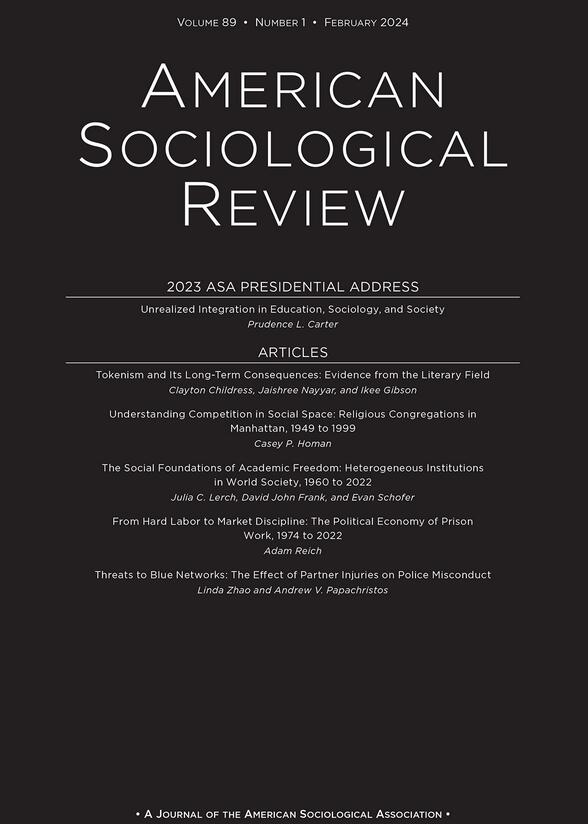Hierarchies in the Decentralized Welfare State: Prioritization in the Housing Choice Voucher Program
IF 6.2
1区 社会学
Q1 SOCIOLOGY
引用次数: 1
Abstract
Social provision in the United States is highly decentralized. Significant federal and state funding flows to local organizational actors, who are granted discretion over how to allocate resources to people in need. In welfare states where many programs are underfunded and decoupled from local need, how does decentralization shape who gets what? This article identifies forces that shape how local actors classify help-seekers when they ration scarce resources, focusing on the case of prioritization in the Housing Choice Voucher Program. We use network methods to represent and analyze 1,398 local prioritization policies. Our results reveal two patterns that challenge expectations from past literature. First, we observe classificatory restraint, or many organizations choosing not to draw fine distinctions between applicants to prioritize. Second, when organizations do institute priority categories, policies often advantage applicants who are formally institutionally connected to the local community. Interviews with officials, in turn, reveal how prioritization schemes reflect housing agencies’ position within a matrix of intra-organizational, inter-organizational, and vertical forces that structure the meaning and cost of classifying help-seekers. These findings illustrate how local organizations’ use of classification to solve on-the-ground organizational problems and manage scarce resources can generate additional forms of exclusion.去中心化福利国家的等级制度:住房选择券计划的优先顺序
美国的社会保障是高度分散的。大量的联邦和州资金流向了地方组织行为者,他们被授予如何将资源分配给有需要的人的自由裁量权。在福利州,许多项目资金不足,与当地需求脱钩,权力下放如何影响谁得到什么?这篇文章确定了影响当地行动者在配给稀缺资源时如何对寻求帮助者进行分类的力量,重点关注住房选择券计划中的优先顺序。我们使用网络方法来表示和分析1398个本地优先级策略。我们的研究结果揭示了两种挑战过去文献期望的模式。首先,我们观察到分类限制,或者许多组织选择不在申请人之间进行细微区分来确定优先顺序。其次,当组织确实制定了优先类别时,政策往往有利于与当地社区有正式制度联系的申请人。对官员的采访反过来揭示了优先顺序计划如何反映住房机构在组织内、组织间和垂直力量矩阵中的地位,这些力量构成了对寻求帮助者进行分类的意义和成本。这些发现表明,地方组织使用分类来解决当地组织问题和管理稀缺资源,会产生额外形式的排斥。
本文章由计算机程序翻译,如有差异,请以英文原文为准。
求助全文
约1分钟内获得全文
求助全文
来源期刊

American Sociological Review
SOCIOLOGY-
CiteScore
13.30
自引率
3.30%
发文量
35
期刊介绍:
The American Sociological Association (ASA) is a non-profit membership association established in 1905. Its mission is to advance sociology as a scientific discipline and profession that serves the public good. ASA is comprised of approximately 12,000 members including faculty members, researchers, practitioners, and students in the field of sociology. Roughly 20% of the members work in government, business, or non-profit organizations.
One of ASA's primary endeavors is the publication and dissemination of important sociological research. To this end, they founded the American Sociological Review (ASR) in 1936. ASR is the flagship journal of the association and publishes original works that are of general interest and contribute to the advancement of sociology. The journal seeks to publish new theoretical developments, research results that enhance our understanding of fundamental social processes, and significant methodological innovations. ASR welcomes submissions from all areas of sociology, placing an emphasis on exceptional quality.
Aside from ASR, ASA also publishes 14 professional journals and magazines. Additionally, they organize an annual meeting that attracts over 6,000 participants. ASA's membership consists of scholars, professionals, and students dedicated to the study and application of sociology in various domains of society.
 求助内容:
求助内容: 应助结果提醒方式:
应助结果提醒方式:


